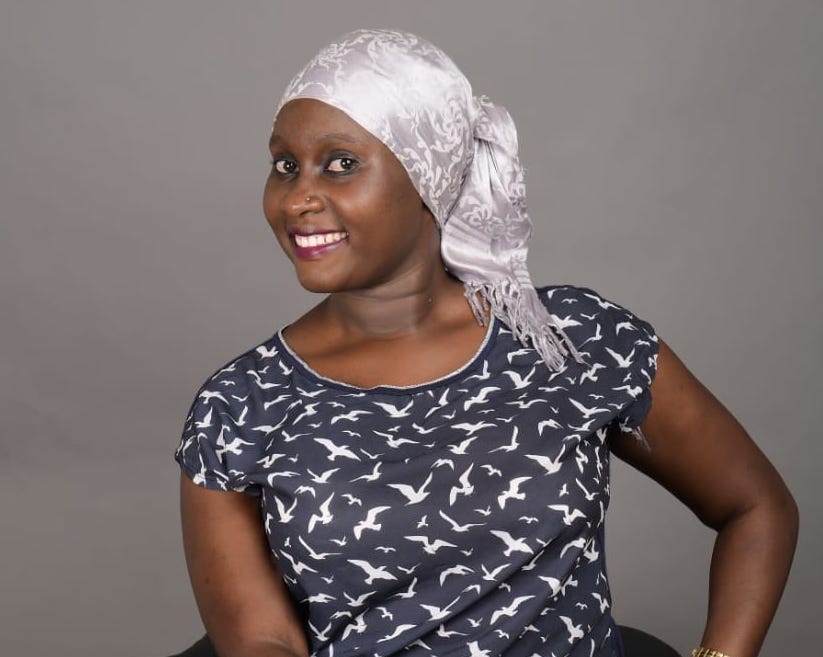Unsung reproductive health champion of Bungoma

Each day she sets out to speak to young women and girls about family planning or safe motherhood, Rahma Issa, 24, comes face to face with how myths about the use of contraceptives are entrenched in her western Kenyan community.
And so, when she explains various methods young women and girls can use to prevent unintended pregnancies in the congested and shanties of Mjini informal settlements, sprawling Mfutu, and the bustling Kanduyi town in Bungoma county, they ask her a plethora of questions: “Is it true, I can get pregnant if we have sex standing?
Will I get a baby after using a family planning method or drug?” But for her, such questions kicks off her day.
For close to four years, Issa has been involved as a peer educator on Sexual Health and Reproductive Rights (SRHR) of adolescent girls and boys in the county, championing and representing their voices in regional and global meetings.
“This is greater and fulfilling than anything ever before,” says Issa, a member of Bungoma Youth Connect— a youth-led community based organisation empowering adolescents on SRHR, peace building and environment conservation.
“I will not keep quiet if I see any young girl suffering around me. I always speak up,” she adds.
Crucial indicators
Issa and her fellow peer educators have educated dozens of girls on the family planning options available to them, distributed condoms, sanitary pads, and conducted blood drives for maternal and newborn health.
“When we talk to the young people, we get their side of the story. Young people are going through a lot, but do not know where to get help.
I am happy, the work I do has undoubtedly saved many of them from dropping out of school due to unintended pregnancies,” says Issa, who traces her involvement in community work back to when she was 12.
But even as cases of Covid-19 continue to decrease, public health directives of social distancing, sanitising hands or wearing masks is still a big challenge where Issa lives.
The Kenya Demographic and Health Survey (KDHS) 2014 indicates that the public sector is the major source of contraceptive methods in Kenya, providing contraception to six out of 10 (60 percent) of current users. It, therefore, remains critical to adequately resource it to meet the reproductive health care needs of women and their partners.
Before Covid-19, the country was struggling to meet funding requirements for SRHR.
In Bungoma, the rate of teenage pregnancy has slightly risen during this period, says Christine Naliaka, Deputy Chief County Nurse.
The rate among young girls aged 10-19 between January and June was at 1,165 in Kanduyi sub-county, Webuye West 787, Cheptais 778, Tongaren 697, Mt Elgon 508 and Sirisia 190.
For post abortion care services during the same period included 793 from Kanduyi, Webuye West 665, Tongaren 443, Cheptais 276 and Sirisia 220.
“With Uganda border at Malaba closed due to Covid-19, truck drivers spend about four to five days in these transit towns, hence fueling sex trade. This only means there is a lot of unprotected sex resulting in unintended pregnancies,” adds Naliaka.
Mama bags
On matters maternal and newborn health, the county has registered improvement. The county’s target population for deliveries is 58,078 for antenatal care up to the fourth visit, delivery and family planning continuation.
“In January, our target was 4,839 for the first ANC visit, but we recorded 5,755 clients, while facility delivery during the same period stood at 2,751,” explains Naliaka, noting that increased facility deliveries from last quarter of 2019 was as a result of an initiative dubbed ‘Mama Bags’ —where women were given baby shawl, soap, sanitary towels and lesso after giving birth in health facilities.
The county also did well on family planning services, with injectables as the most preferred option recording 29,148 and 34,138 clients in the first and second quarter respectively.
Maureen Oduor, advocacy officer at DSW, says adolescent girls are less likely to access SRHR in the wake of Covid-19, thus endangering their lives.
“The full realisation of all women’s SRHR needs remains far from being addressed. But the gains we have made shouldn’t be wiped by the pandemic” explains Oduor who oversees SRHR advocacy in the county.
Solutions for access to such services should not be a-one-shoe fit-all affair. There is need for multi-sectoral approach in three areas.
“At the family level; parents should guide children, provide basic needs, and monitor friends their teenagers interact with; at administrative level: the chief, Nyumba Kumi officials can reinforce discipline backed by support from CHVs in creating awareness; and at the health facility level; they should be encouraged to have ‘youth-friendly services’ and use data to make informed decisions on access” adds Naliaka.
Dr Maricianah Onono, a research scientist at Kemri-Wellcome Trust believes there is need to reduce unmet needs and give women and girls choices on contraception.
“As a nation, we should not demonise healthcare workers, but women and girls needs to be counselled on side effects, need for choices and access when it comes to contraceptives”
She further suggests adolescent girls and women’s healthcare needs should take the following shape; a life course sexual health approach, championing the need for sexually transmitted infections diagnostic within the healthcare facilities and expanding the contraceptive access.
*****************
Deutsche Stiftung Weltbevoelkerung (DSW) is implementing a three-year initiative (2019 – 2021) in Kenya, advocating for more and better funds for family planning from the national government and 11 county governments. DSW is also working with civil society organisations and youth-led organisations towards improved national and county family planning policies. The 11 counties are West Pokot, Kilifi, Laikipia, Meru, Mombasa, Nakuru,Nyandarua, Nandi, Bungoma, Trans Nzoia and Uasin Gishu.
Through this initiative, DSW trains and supports young people to lead advocacy efforts for more and better funds for family planning from the national government and 11 county governments. Rahma Issa is one of the 130 young people trained and being supported by DSW in Kenya





